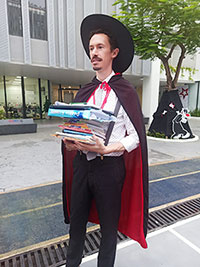How I led my school through the impacts of the COVID-19 pandemic

I graduated from Loyola University Maryland’s Curriculum & Instruction for Social Justice (CISJ) program in early 2019. Back then, it was referred to simply as Curriculum & Instruction, but there was no doubt the goal was social justice. After I graduated from Loyola, I accepted a role as Head of Program for the English department at an international school in Hai Phong, Viet Nam. After a few months, our Head of School (HOS) had to return home due to a family emergency, and I served as the interim HOS while the school searched. Several months went by, and like all countries around the world, we began to realize the impact of the Covid-19 pandemic. Our city locked down, our school went completely online, and the world of education flipped entirely upside down. Nothing I had learned seemed to have prepared me for this catastrophe, but I was wrong about that. In fact, almost everything I had learned at Loyola served me well to weather this transformation. My educational technology classes became immediately useful. MOOCs, LMSs, and Web 2.0 became facts of life. Flipped classrooms, blended learning, and digital individualized instruction become de rigor for our everyday work. As we began to roll into the digital edu-verse, we thought we understood how we could navigate this challenge, yet we were missing the mark. Though our practical world had been filled in, we had not realized the extent of our social issues. There were objective problems, such as how to provide internet access and mobile technology for students who lived in rural spaces, or who had no means of connection aside from a keypad cell phone. And there were subjective problems, such as how to support young learners navigating new technology, or how to build online spaces to develop relationships and overcome the loneliness of days and weeks of screen time. “Connection” became our top priority in every sense of the word.
Precisely because of my experience at Loyola in the CISJ program, the questions we asked became the engines of our learning. We incorporated a model meant to use content learning as a vehicle for language learning and flipped it to recognize how we could incorporate social-emotional learning into subject knowledge. We increased the relevance of interaction to recognize the barriers moving online had revealed, and how we could support one another through resource sharing and collaboration. We reframed teacher-centered content models to student-centered instructional paradigms build on engagement, collaboration, and meaningfulness. Our world flipped upside down, and it was—without a bubble of a doubt—my most challenging experience as an educator. Though I was underwater for a good while, we never drowned, and when we got the opportunity to emerge from the waves, we were much stronger for it.
Move forward a couple years, and I am still Head of School. Our student population has expanded by about 300%, and though Covid-19 was an incredible challenge, we are still growing strong. Our teachers faced the challenges head on, and administrators gave every ounce of support we could muster. My time in the CISJ program founded my beliefs in the need for building education as a tool for access, quality of life, and social change. This year, we are back on campus, and our students have organized charity concerts, written textbooks for underprivileged schools, led clean air drives for the district, collected learning materials for rural early years schools, and donated funds for a local hospital to help fight Covid-19. These students are demonstrating themselves as engaged, purposeful, and responsible citizens, and it is only the first semester! Through our time online, we have realized the inherent need for social support and the impact we can have on each other and our communities. I have no doubt everything I learned in the CISJ has helped drive our school and the accomplishments of our students. The CISJ program radically and authentically changed my views and practices as to the purpose of learning and education, and it directly manifests in the social responsibility of our students and school. My next years will hopefully grow my influence to impact our current students for a better future world. I even hope to find myself further pursuing my own learning and education, and I know the CISJ program will be my ballast then as well.